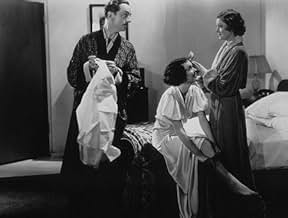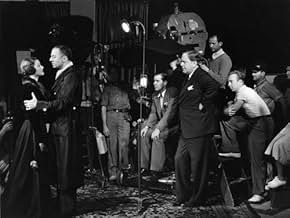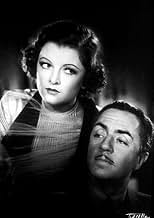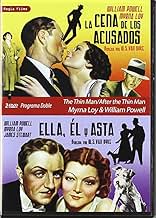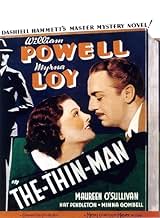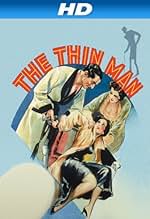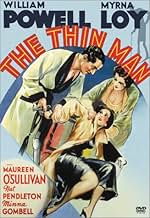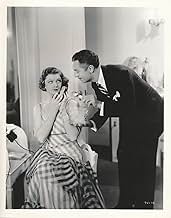Former detective Nick Charles and his wealthy wife Nora investigate a murder case, mostly for the fun of it.Former detective Nick Charles and his wealthy wife Nora investigate a murder case, mostly for the fun of it.Former detective Nick Charles and his wealthy wife Nora investigate a murder case, mostly for the fun of it.
- Nominated for 4 Oscars
- 3 wins & 4 nominations total
Will Aubrey
- Minor Role
- (uncredited)
William Augustin
- Wynant's Butler
- (uncredited)
Polly Bailey
- Janitress
- (uncredited)
- Director
- Writers
- All cast & crew
- Production, box office & more at IMDbPro
Storyline
Did you know
- TriviaWilliam Powell spoke of how much he loved working with Myrna Loy because of her naturalness, her professionalism, and her lack of any kind of "diva" temperament. "When we did a scene together, we forgot about technique, camera angles, and microphones. We weren't acting. We were just two people in perfect harmony," he said. "Myrna, unlike some actresses who think only of themselves, has the happy faculty of being able to listen while the other fellow says his lines. She has the give and take of acting that brings out the best."
- GoofsWhen Nick and the coroner look at the body through the Fluoroscope, the bullet, and a piece of shrapnel, appear as bright white. The Fluoroscope uses X-rays except it is viewed on a screen instead of film. Dense objects, such as bones, appear dark, as it appears in the movie. The bullet and shrapnel should then be even darker as it blocks even more of the X-rays. However, this would not have shown up well in the movies, so they were made bright white so the viewers could see them easily.
- Quotes
Nora Charles: Waiter, will you serve the nuts? I mean, will you serve the guests the nuts?
- Crazy creditsOpening credits are shown with the original novel by Dashiell Hammett in the background.
- Alternate versionsThere is an Italian edition of this film on DVD, distributed by DNA srl, "L'AMANTE SCONOSCIUTA (1934) + THE THIN MAN (L'uomo ombra, 1934)" (2 Films on a single DVD), re-edited with the contribution of film historian Riccardo Cusin. This version is also available for streaming on some platforms.
- ConnectionsFeatured in Hollywood: The Fabulous Era (1962)
Featured review
Where to begin? I guess I'll start off by saying that this is one of my favorite films of all time. I first saw it on TV years ago (I was probably eleven or twelve) and I still totally love it. Every time I see it, I feel like I get more out of it. I feel like I see AND hear more than I did before.
The story goes that creepy Clyde Wynant (wonderful character actor Edward Ellis) wants to give some bonds to his daughter Dorothy (Maureen O'Sullivan) as a wedding present. But his mistress Julia (Natalie Moorhead) has gotten rid of them. When Julia turns up murdered, Wynant is the obvious suspect, but nobody can find him.
Enter Nick and Nora Charles (William Powell and Myrna Loy), a detective and heiress, just recently married, and clearly very much in love. Nick finds himself pulled into the case, with everyone around him urging him into it. He's reluctant: it's his honeymoon after all. But sure enough he's persuaded to take the case, solves it and exposes the murderer at a climactic dinner party.
Bill Powell and Myrna Loy have astounding chemistry. As husband and wife, they are equals, equally hard-drinking, equally witty, equally fun-loving. They have the same sense of adventure, the same stubbornness, the same competitiveness. In so many scenes, Powell will saw something in his playful, semi-childish, half-drunk sort of way, and Loy will respond with some fabulously delivered retort, in a manner that is almost like a world-wary mother saying to her child 'Now, now, Junior...' It's hard to describe exactly. If anything, I suppose you could say it's deceptively simple. It's one of those things you have to see for yourself.
The rest of the cast is good. I particularly love Minna Gombell, Mynant's ex-wife Mimi, with her latin boyfriend (Cesar Romero) and her tight, shiny black dresses with white fur-lined princess sleeves. Slight, ernest and bespeckeled, William Henry turns in a riotous performance as Gilbert, Mimi and Clyde Wynant's son and Dorothy's brother. A Kinsey-lke figure, the role of Gilbert is one of those bookish, overly-analytical Hollywood stock characters who try to explain other character's subconscious reasons for their actions, and who give strangers peculiar looks at parties. Henry makes the character believable, and he stands out as one of the characters in the movie. Gerturde Short, in an uncredited role, gives a good performance as well. Her delivery of the "I don't like crooks, and if I did like'em..." line is unforgettable. (If you blink, you'll miss Tui Lorraine Bow, friend and step-mother of It Girl Clara Bow! Bert Roach of The Crowd has a small role as well.)
For a modestly-budgeted, rapidly shot, b-level production, The Thin Man is a classy and stylish film. The clothes, assembled by the genial Dolly Tree, are great, and make this a must-see anyone even remotely interested in period fashions. The art deco sets are quite fine, if modest and at times a bit sparse. The editing is good, as is the fairly simplistic photography. Woody Van Dyke, the director, always worked fast, and Myrna Loy recalled that all the movies they worked together on were made at frantic pace. Part of the reason that The Thin Man moves so quickly is the fact that production was so hurried.
The Thin Man gets a ten out of ten from me for being one of the best films ever produced, and one of my absolute favorites of all time.
The story goes that creepy Clyde Wynant (wonderful character actor Edward Ellis) wants to give some bonds to his daughter Dorothy (Maureen O'Sullivan) as a wedding present. But his mistress Julia (Natalie Moorhead) has gotten rid of them. When Julia turns up murdered, Wynant is the obvious suspect, but nobody can find him.
Enter Nick and Nora Charles (William Powell and Myrna Loy), a detective and heiress, just recently married, and clearly very much in love. Nick finds himself pulled into the case, with everyone around him urging him into it. He's reluctant: it's his honeymoon after all. But sure enough he's persuaded to take the case, solves it and exposes the murderer at a climactic dinner party.
Bill Powell and Myrna Loy have astounding chemistry. As husband and wife, they are equals, equally hard-drinking, equally witty, equally fun-loving. They have the same sense of adventure, the same stubbornness, the same competitiveness. In so many scenes, Powell will saw something in his playful, semi-childish, half-drunk sort of way, and Loy will respond with some fabulously delivered retort, in a manner that is almost like a world-wary mother saying to her child 'Now, now, Junior...' It's hard to describe exactly. If anything, I suppose you could say it's deceptively simple. It's one of those things you have to see for yourself.
The rest of the cast is good. I particularly love Minna Gombell, Mynant's ex-wife Mimi, with her latin boyfriend (Cesar Romero) and her tight, shiny black dresses with white fur-lined princess sleeves. Slight, ernest and bespeckeled, William Henry turns in a riotous performance as Gilbert, Mimi and Clyde Wynant's son and Dorothy's brother. A Kinsey-lke figure, the role of Gilbert is one of those bookish, overly-analytical Hollywood stock characters who try to explain other character's subconscious reasons for their actions, and who give strangers peculiar looks at parties. Henry makes the character believable, and he stands out as one of the characters in the movie. Gerturde Short, in an uncredited role, gives a good performance as well. Her delivery of the "I don't like crooks, and if I did like'em..." line is unforgettable. (If you blink, you'll miss Tui Lorraine Bow, friend and step-mother of It Girl Clara Bow! Bert Roach of The Crowd has a small role as well.)
For a modestly-budgeted, rapidly shot, b-level production, The Thin Man is a classy and stylish film. The clothes, assembled by the genial Dolly Tree, are great, and make this a must-see anyone even remotely interested in period fashions. The art deco sets are quite fine, if modest and at times a bit sparse. The editing is good, as is the fairly simplistic photography. Woody Van Dyke, the director, always worked fast, and Myrna Loy recalled that all the movies they worked together on were made at frantic pace. Part of the reason that The Thin Man moves so quickly is the fact that production was so hurried.
The Thin Man gets a ten out of ten from me for being one of the best films ever produced, and one of my absolute favorites of all time.
- Kieran_Kenney
- Jul 19, 2004
- Permalink
- How long is The Thin Man?Powered by Alexa
Details
- Release date
- Country of origin
- Language
- Also known as
- Der dünne Mann
- Filming locations
- Production companies
- See more company credits at IMDbPro
Box office
- Budget
- $226,408 (estimated)
- Runtime1 hour 31 minutes
- Color
- Aspect ratio
- 1.37 : 1
Contribute to this page
Suggest an edit or add missing content




